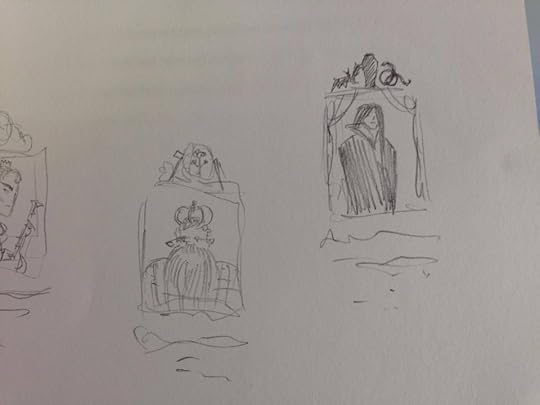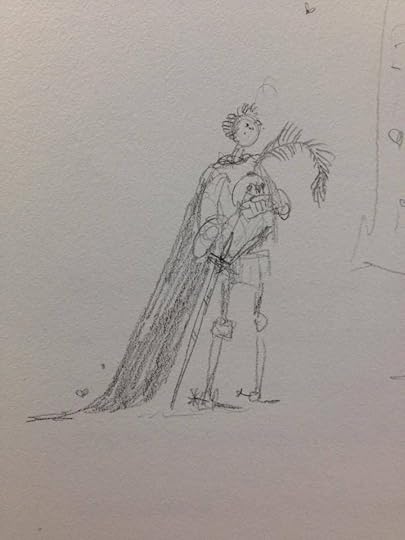Angela Slatter's Blog, page 93
December 30, 2014
In the mail, oh! In the mail …
And the glorious Pretty Little Dead Girls by the equally glorious Mercedes Murdock Yardley arrived in yesterday’s mail. With cover art by the amazing Galen Dara and the loveliest postcard by the absolutely superb Orion Z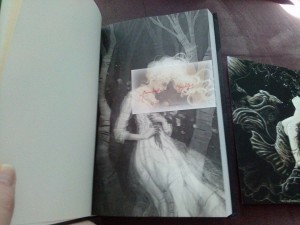
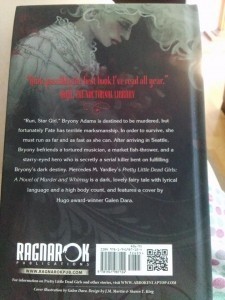 angara!
angara!
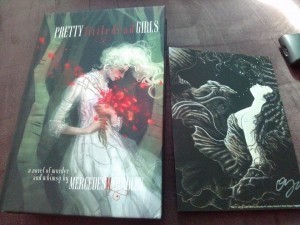
December 29, 2014
Project avec iguanas
So Kathleen Jennings and I spent all of yesterday at the State Library of Queensland, holed up and working on a new project. Here are some of the initial sketches.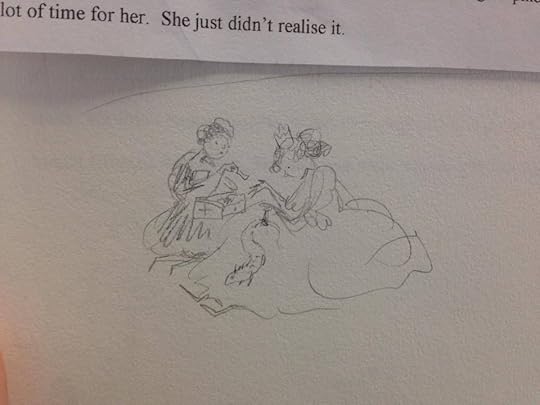
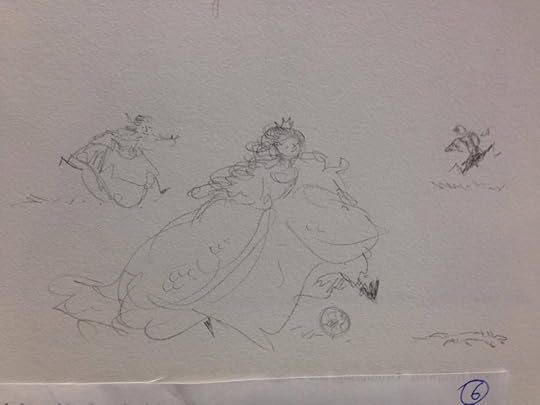
Err, Umm
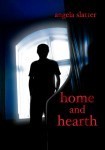 There was an email from the website contact yesterday, headed “Home and Hearth”. Alas, it went into the spam folder and was deleted by my oh-too-quick fingers. So, if it was a pleasant email, perhaps it might be re-sent by the pleasant person?
There was an email from the website contact yesterday, headed “Home and Hearth”. Alas, it went into the spam folder and was deleted by my oh-too-quick fingers. So, if it was a pleasant email, perhaps it might be re-sent by the pleasant person?
If it was about availability, I think Simon at Spectral Press still has a couple of chapbooks, and I’ll be putting a Kindle version on Amazon soon.
December 19, 2014
Schlock Magazine and The Bitterwood Bible
 Over at Schlock Magazine Teo Relijic stakes a claim on Marco Attard’s real estate and chats about The Bitterwood Bible and Other Recountings.
Over at Schlock Magazine Teo Relijic stakes a claim on Marco Attard’s real estate and chats about The Bitterwood Bible and Other Recountings.
Slatter’s world can take in so many disparate elements because her prose is both rich and assured. There’s a descriptive indulgence in her work that never devolves into tacky excess, mainly because Slatter has a solid grounding in fairy tale narrative structure (a path that Slatter has trod even as a scholar). The general thrust of the stories is always secure, and so details can be piled on without distracting too much from the overall picture. Consider this telling passage from ‘The Undone and the Divine’.
‘The ghosts spend their days profitably, doing precisely what they did in life. 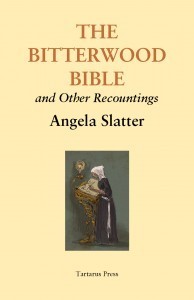 Trading, gossiping, building, baking, shoeing ephemeral horses with u-shaped things made of smoke and promises, sleeping when the sun sets and rising when it shows its face once more, fornicating as is only natural. Such coupling, however, is unsatisfying, for it produces nothing, neither pleasure nor offspring; ethereal fingers pass through gossamer flesh.’
Trading, gossiping, building, baking, shoeing ephemeral horses with u-shaped things made of smoke and promises, sleeping when the sun sets and rising when it shows its face once more, fornicating as is only natural. Such coupling, however, is unsatisfying, for it produces nothing, neither pleasure nor offspring; ethereal fingers pass through gossamer flesh.’
Ze rest is here.
December 18, 2014
The Female Factory – Goodreads Giveaway
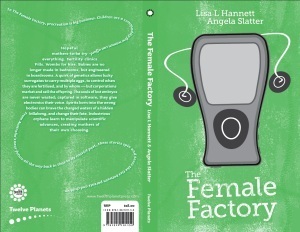 Head on over here for a chance to win a copy of The Female Factory, by myself and Lisa L. Hannett.
Head on over here for a chance to win a copy of The Female Factory, by myself and Lisa L. Hannett.
These stories will hurt you. They will rattle your thoughts like marbles. They will inhabit you like another body. Introduction by Amal El-Mohtar
It’s number eleven in the Twelve Planets series from Twelfth Planet Press.
December 16, 2014
Extract from The Bitterwood Bible at Tor.com!
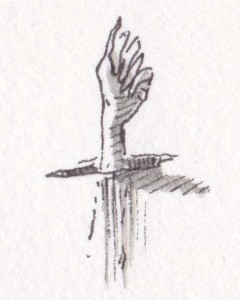 Because apparently I live there now! No, really, last one, I promise.
Because apparently I live there now! No, really, last one, I promise. 
The extract is from “The Maiden in the Ice”, with art from Kathleen Jennings.
“The Maiden in the Ice”
Rikke does not like crossing the ice.
Even during the harshest of winters, when the surface of the lake seems changed to bedrock, when it is frozen so thick you cannot see what lies below, even then, she does not like it. Ice is tricksy; it cannot be trusted. Rikke knows this—has known it ever since her little brother Geir went through four years ago. She still remembers, still re-imagines each year as the seasons change and grey frost-filled clouds gather, as the air cools and the stream and the lake become sluggish, until they stop moving altogether and households must break off chunks of freeze to dump in a pot above the fire for fresh water. She thinks how he looked, when they finally found him, days after an unseasonal thaw, at the spot to which the currents draw all debris, at the break in the earth where the flow spits out unwanted things. He was small, so terribly small, which meant he didn’t get caught on some sunken obstacle and stay beneath until the flesh and muscle decayed and released his bones to the depths. He was small and whole and pale, not even beginning to bloat, and his eyes had turned snow-storm white.
No, Rikke does not trust the ice.
The rest is here.
December 12, 2014
The Weekend Australian reviews The Bitterwood Bible
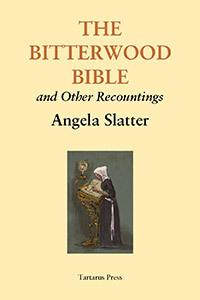 Much excitement here this morning to find that George Williams has reviewed The Bitterwood Bible and Other Recountings in The Weekend Australian‘s arts section. Much dancing and running in circles making loud noises. Or, you know, something more dignified.
Much excitement here this morning to find that George Williams has reviewed The Bitterwood Bible and Other Recountings in The Weekend Australian‘s arts section. Much dancing and running in circles making loud noises. Or, you know, something more dignified.
FANS of fantasy fiction have come to expect great things from Queensland author Angela Slatter. She won an Aurealis Award for The Girl with No Hands and Other Tales and was a finalist in the World Fantasy Awards for Sourdough and Other Stories.
With these and other collections, she has carved a niche as one of the best writers of short stories of dark fantasy. In a field where trilogies and even 10-book series have become commonplace, these short works provide a more than welcome counterpoint.
In The Bitterwood Bible and Other Recountings, Slatter returns to familiar territory. What was supposed to be a sequel to Sourdough and Other Stories instead turned into a prequel as she became immersed in explaining her complex world in ever greater detail. She does so in 13 stories that expand on the earlier book by showing how things and people came to be.
The collection begins with The Coffin Maker’s Daughter, for which Slatter became the 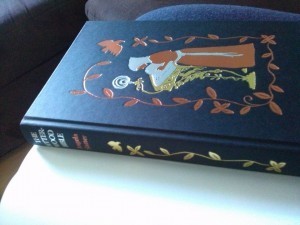 first Australian to win a British Fantasy Award. It introduces the character of Hepsibah Ballantyne, a maker of coffins who is accompanied on her rounds by her hectoring, ghostly father. Ballantyne presents herself at the house of the deceased, only to take a shine to the dead man’s daughter, describing her as ‘‘pink and peach and creamy. I want to lick at her skin and see if she tastes the way she looks.” From there the story intertwines death and lust, until the end arrives with a quirky, dark twist. It’s a brilliant opening to the book.
first Australian to win a British Fantasy Award. It introduces the character of Hepsibah Ballantyne, a maker of coffins who is accompanied on her rounds by her hectoring, ghostly father. Ballantyne presents herself at the house of the deceased, only to take a shine to the dead man’s daughter, describing her as ‘‘pink and peach and creamy. I want to lick at her skin and see if she tastes the way she looks.” From there the story intertwines death and lust, until the end arrives with a quirky, dark twist. It’s a brilliant opening to the book.
The rest is here.
Over at Tor.com …
 … I talk about one of my fave creations, Merricat, from Shirley Jackson’s We Have Always Lived in the Castle.
… I talk about one of my fave creations, Merricat, from Shirley Jackson’s We Have Always Lived in the Castle.
I came to the Shirley Jackson party late. The first thing I read was The Haunting of Hill House, and that was just last year. On my way to the park for a lunchtime walk and brain-clearing, I pulled a parcel from the post box. In the park I didn’t refrain from tearing open said parcel because, well, book. I did laps whilst reading this tremendously weird tale, and by the time I returned home there was a kind of strange translucent wallpaper over my vision, an image of Hill House superimposed on the things of my everyday life. That’s kind of disturbing.
For the rest of “On the Masterful Creepiness of Merricat”, go here.
December 11, 2014
Over at The Writing Platform …
 … I talk about online presence for writers in Online Presence: Pros, Perils and Possibilities. Thanks to Dr Donna Hancox for the opportunity to opine!
… I talk about online presence for writers in Online Presence: Pros, Perils and Possibilities. Thanks to Dr Donna Hancox for the opportunity to opine!
I often hear newer writers (of varying ages) say they want their writing to speak for itself. They’re filled with disdain for publishers who look for an online presence, and utterly scornful of writers who actively and efficiently use social media to their advantage. What I generally say to such writers (after I stop laughing) is that their highfalutin’ sentiments are delightful, however, if no one can find their writing/book/them then whatever it says is unlikely to be heard.
Your online presence can be a blessing or a curse, but it’s what you make it. Just as fire is an excellent servant, it’s a terrible master. You need to control your own social media persona. I understand the reluctance and the fear, I really do. The internet is a chaotic mess of noise, opinions, cat pictures and porn. So much porn. I didn’t have website until I met Jeff VanderMeer in 2009, and he yelled at me until I caved. Five minutes and one WordPress site later… What he said made sense: you’ve been publishing for three years, readers and editors and publishers are paying attention. They’re looking for you; be easier to find.
The rest is here.

